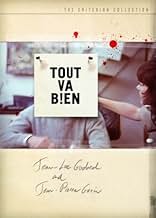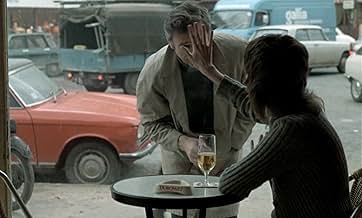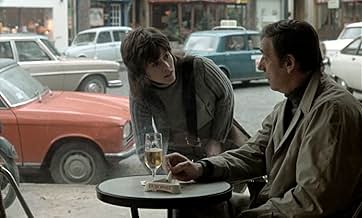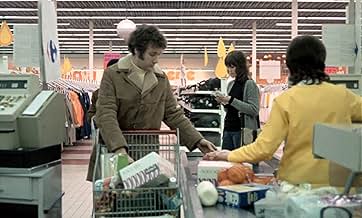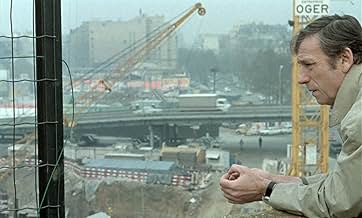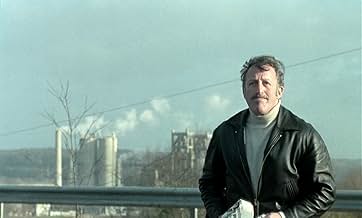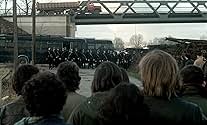Una huelga en una fábrica de salchichas francesa contribuye al distanciamiento de un cineasta y su esposa reportera.Una huelga en una fábrica de salchichas francesa contribuye al distanciamiento de un cineasta y su esposa reportera.Una huelga en una fábrica de salchichas francesa contribuye al distanciamiento de un cineasta y su esposa reportera.
- Dirección
- Guionistas
- Elenco
- Premios
- 1 premio ganado en total
Louis Bugette
- Georges
- (as Bugette)
Yves Gabrielli
- Léon
- (as Yves Gabrieli)
- Dirección
- Guionistas
- Todo el elenco y el equipo
- Producción, taquilla y más en IMDbPro
Opiniones destacadas
Tout va bien (1972)
** (out of 4)
Jean-Luc Godard and Jea-Pierre Gorin directed this film about two directors (Godard, Gorin) who are trying to piece a film together, which is being played out by Jane Fonda and Yves Montand. Godard has been very hit and miss with me so this film here is somewhat in the middle. I really didn't hate this movie but at the same time I can't say that I was entertained by it either. I think there's some good ideas floating around here but I never felt like they were pulled together to make anything too interesting. I'm sure fans of the film will say there's a political message here and I'm sure there is somewhere but with all the madness going on I wasn't about to look for it. I think Montand is very good in his role but Fonda was a tad bit lacking and this is probably the biggest disappointment I've had with any of her films. I really enjoyed the sequence in the store and there's some very good moments scattered around but in the end this is just Godard being Godard and I wasn't going for it.
** (out of 4)
Jean-Luc Godard and Jea-Pierre Gorin directed this film about two directors (Godard, Gorin) who are trying to piece a film together, which is being played out by Jane Fonda and Yves Montand. Godard has been very hit and miss with me so this film here is somewhat in the middle. I really didn't hate this movie but at the same time I can't say that I was entertained by it either. I think there's some good ideas floating around here but I never felt like they were pulled together to make anything too interesting. I'm sure fans of the film will say there's a political message here and I'm sure there is somewhere but with all the madness going on I wasn't about to look for it. I think Montand is very good in his role but Fonda was a tad bit lacking and this is probably the biggest disappointment I've had with any of her films. I really enjoyed the sequence in the store and there's some very good moments scattered around but in the end this is just Godard being Godard and I wasn't going for it.
Godard builds his films from scratch. It's not that he shows up on the first day of shooting with no script or idea of what he wants. He simply works from an entirely different angle than most other directors. In an inventive, cerebral, pretentious manor, Godard and his co- director here, Jean-Pierre Gorin, shows us scene after scene. After each one, we naturally ask ourselves questions pertaining to the characters and the story. The story, or should I say the film, unravels further. We then not only ask ourselves the expected question, "What does this movie mean?" We also ask ourselves, "What is this movie about?" Godard drops characters and settings into a stirring pot, sprinkling it with title cards and captions, then pours them all into the oddly shape bowl of a film structure that he has fashioned himself. His cinematic expression is less a communication to and more a confrontation with the audience. He does not make his film easy on you. Still, his cinematography is interesting, and I admire some of his ideas.
Have I made it unclear where Tout Va Bien stands in my opinion? OK. Well, let me tell you that it is quite an interesting film, an especially unpredictable one, yet Godard and Gorin, as the occasional European filmmaker will do, just as Haneke does, enjoy the feeling of being beyond the audience. What is said with Tout Van Bien, politically, socially, sexually, is expressed as if we, the audience, are the ignorant ones he is in disagreement with.
The high points of this film are the presence of Jane Fonda and a very very long sideways steadicam shot that slowly moves from left to right repeatedly across several check-out lines in a grocery store as tension and rage slowly builds.
Have I made it unclear where Tout Va Bien stands in my opinion? OK. Well, let me tell you that it is quite an interesting film, an especially unpredictable one, yet Godard and Gorin, as the occasional European filmmaker will do, just as Haneke does, enjoy the feeling of being beyond the audience. What is said with Tout Van Bien, politically, socially, sexually, is expressed as if we, the audience, are the ignorant ones he is in disagreement with.
The high points of this film are the presence of Jane Fonda and a very very long sideways steadicam shot that slowly moves from left to right repeatedly across several check-out lines in a grocery store as tension and rage slowly builds.
I find that the films of Jean-Luc Godard rarely speak to me, but they do, such as Pierrot Le Fou, it really hits hard. Perhaps he's most effective when he talks about cinema itself. While Pierrot is most profoundly interesting through its debate about the arts, Tout Va Bien immediately addresses its own existence in its opening scene. It analyzes premise, storytelling, filmmaking and how they got the film made with how it cast two major stars in the lead roles. It's fascinatingly direct, almost confessional. With this abrasive and confrontational style in mind it charges full throttle into its politics of the French revolution in the late 60s as the lower and middle classes rebel against capitalism. While sometimes it can be a little too on-the-nose with its arguments as characters talk to the audience, Godard's point is undeniable and its very well demonstrated through the style. The highlight of the film is definitely the use of sets and colour. I love the stage-like sets where you can see into two floors and a dozen rooms. It categorizes the drama in a cartoonish way that satirizes the politics brilliantly while still retaining their power. Although this argument does interrupt the initial contrived story, it jumps back into it seamlessly making it work for the characters in an unexpectedly emotional way. Tout Va Bien is an incredible film and one of Godard's finest efforts. It lived up to my expectations and more.
9/10
9/10
I've always found a kind of disconnect between the Godard films of the 60's and the Godard films of the 80's, 90's and today, which is that in the past twenty or so years Godard has kept on experimenting, not telling the usual stories that we're used to in movies, with impressive camera-work and aloof actors. But in these films he's also gotten rather boring with his material, and sometimes his experimenting goes a little over the edge for my taste. I had yet to see a work of his from the 70's, however, until Tout va Bien, or Everything is Fine (many of his films are either very limited or totally unavailable in the US). It's actually a good movie for him and co-writer/director Jean-Pierre Gorin. Gorin, unlike Godard, was not a big-time cinephile, but did have motivations to become a political filmmaker. What they concocted was a kind of response to the ways that political films are not made, and should or could be made, in the independent/art world of cinema. This time, as usual, Godard takes very long shots of people talking, and has a couple of his inventive, almost scarily calm tracking shots. But this time as well he has two international stars on his hands. This is where he and Gorin get creative more so.
It's a tale of the working class against the ruling class that gets one thinking during the film, and even after it. They place Jane Fonda and Yves Montand as a married couple who get locked in a bitter struggle between meat-factory workers and the management not giving them their proper due. Although Fonda and Montand are the 'stars' of the movie, right off the start of the film (including discussing narrating voices) the whole idea of what this film should be is dissected- the money involved, what the stars should be doing in this story, why should there even BE a story? In short, the film unfolds as the stars become more so observers than the main gig, and the non-professionals (at least I thought they were, they might've been character actors) became the real stars. There are a few monologues, long ones, that go on during this dispute, and they're inter cut with scenes where Godard and Going seem to be showing the double-edge to these workers- they're part determined to get their way, and partly like kids taking over the school.
After these scenes, we get mostly all scenes with the stars, as Montand plays a disaffected art-film-turned-commercial director, and Fonda plays an dissatisfied American reporter. Their dialog together sort of winds down the film (including more monologues), leading up to a scene in a supermarket that almost reaches to the heights of the sustained, overwhelming filmic anarchy of the traffic-jam in Godard's Week End. Then the film ends without much else to say. So, basically, Tout va Bien kept me interested with what the characters/actors/people had to say, and unlike in Godard's 80's films there was a structure. And I liked how the screen-time for the extras ended up being balanced out by that of Fonda and Montand.
The downsides, which there are a few, are that Fonda and Montand, up until their scenes together &/or their monologues, don't have much at all to do in the film. I can't criticize or comment too much on their acting, because they seem to be too natural (by way of Godard/Gorin's simplicity throughout, sometimes funny sometimes not) to be doing anything very powerful. And there were a few times the experimenting got annoying. But overall, Tout va Bien works on its own terms, and its the kind of film now on DVD can find its audience somehow. Whether or not the same audience that embraced with loving arms Breathless and My Life to Live will do the same with this is another matter- it's part frustrating, but part clarity all the same. At the least, it's not just Godard's doing whether or not the film works or not- Gorin deserves equal credit or berating. B+
It's a tale of the working class against the ruling class that gets one thinking during the film, and even after it. They place Jane Fonda and Yves Montand as a married couple who get locked in a bitter struggle between meat-factory workers and the management not giving them their proper due. Although Fonda and Montand are the 'stars' of the movie, right off the start of the film (including discussing narrating voices) the whole idea of what this film should be is dissected- the money involved, what the stars should be doing in this story, why should there even BE a story? In short, the film unfolds as the stars become more so observers than the main gig, and the non-professionals (at least I thought they were, they might've been character actors) became the real stars. There are a few monologues, long ones, that go on during this dispute, and they're inter cut with scenes where Godard and Going seem to be showing the double-edge to these workers- they're part determined to get their way, and partly like kids taking over the school.
After these scenes, we get mostly all scenes with the stars, as Montand plays a disaffected art-film-turned-commercial director, and Fonda plays an dissatisfied American reporter. Their dialog together sort of winds down the film (including more monologues), leading up to a scene in a supermarket that almost reaches to the heights of the sustained, overwhelming filmic anarchy of the traffic-jam in Godard's Week End. Then the film ends without much else to say. So, basically, Tout va Bien kept me interested with what the characters/actors/people had to say, and unlike in Godard's 80's films there was a structure. And I liked how the screen-time for the extras ended up being balanced out by that of Fonda and Montand.
The downsides, which there are a few, are that Fonda and Montand, up until their scenes together &/or their monologues, don't have much at all to do in the film. I can't criticize or comment too much on their acting, because they seem to be too natural (by way of Godard/Gorin's simplicity throughout, sometimes funny sometimes not) to be doing anything very powerful. And there were a few times the experimenting got annoying. But overall, Tout va Bien works on its own terms, and its the kind of film now on DVD can find its audience somehow. Whether or not the same audience that embraced with loving arms Breathless and My Life to Live will do the same with this is another matter- it's part frustrating, but part clarity all the same. At the least, it's not just Godard's doing whether or not the film works or not- Gorin deserves equal credit or berating. B+
Godard work sometimes is not entirely understood. having seen most of his films i must say the this film is one of the more comprehensible of the lot. To my understanding it deals with an important issue of the postmodern graded. the issue of how to react to the capitalist society in which we live in. Being disappointed from the communist party, as well as the worker's unions which turned their backs to the working class, the people are left with no alternative but to commence a revolution, one that uses force, one that shakes the basis of society. He also shows how the burglar reporters and film creator as a representing free mind are also been exploited by the capitalist regime and their creative spirits is dying. for the the solution is to continue creating at all cost. to bring the cry of the people, to help the coming revolution. The last scene at the supermarket is quite fantastic, and it shows the decay of the great ideas (a communist part member sells his book at a discount price but doesn't know what's written there, and the youth that stand up to the society rules and help people to leave the supermarket and not pay). I strongly recommend this movie, although you need some patience with Godard's worth the time.
¿Sabías que…?
- TriviaMost of the shots contain all the three colours of the French flag: blue, white and red.
- Citas
Narrator: There'd be farmers who farm. Workers who work. And bourgeois who bourgeois.
- ConexionesEdited into Bande-annonce de 'Tout va bien' (1972)
- Bandas sonorasIl y a du Soleil sur la France
Music by Eric Charden
Lyrics by Frank Thomas and Jean-Michel Rivat
Performed by Stone et Charden
Selecciones populares
Inicia sesión para calificar y agrega a la lista de videos para obtener recomendaciones personalizadas
- How long is All's Well?Con tecnología de Alexa
Detalles
- Tiempo de ejecución1 hora 35 minutos
- Mezcla de sonido
- Relación de aspecto
- 1.66 : 1
Contribuir a esta página
Sugiere una edición o agrega el contenido que falta

Principales brechas de datos
By what name was Tout va bien (1972) officially released in Canada in English?
Responda
